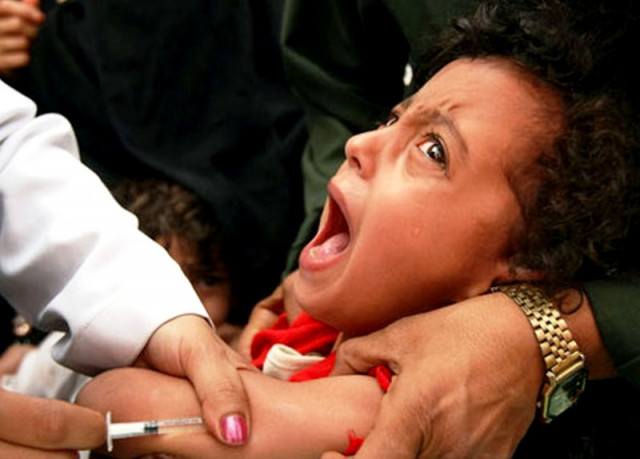Public health: Awareness key to eradicating measles
2,831 cases of measles reported in Lahore till April 15 this year.

Tahir said it was every child’s right to be vaccinated against all preventable diseases. PHOTO: REUTERS / FILE
An awareness drive is needed to educate people on preventive measures against measles, said health experts at a seminar on measles held at the University of Health Sciences (UHS) here on Tuesday.
The seminar was organised by the UHS in collaboration with the Children’s Hospital, Lahore, and the health services directorate general.
Speaking at the seminar, Tahir Masood, the Children’s Hospital dean, said measles was a highly contagious disease caused by a virus.
“It is transmitted from one person to another through coughing or sneezing...Characterised by peculiar rashes, fever and cough, runny nose or red eyes [conjunctivitis],” he said.
Tahir said efforts to avoid secondary infection and limit the spread of the disease were important in measles management.
“People with measles can pass the disease to others four days before the rash appears, as well as four days after that,” he said.
He said it was every child’s right to be vaccinated against all preventable diseases. “Unfortunately, in our country there is no demand for vaccination unless there is an outbreak,” he said, adding, “two doses of measles are vital to get life-long protection against the disease.”
Tahir emphasised the need for maintaining a cold chain to properly store the vaccines as they lost potency when exposed to heat after reconstitution.
Professor Shakila Zaman said measles was one of the most devastating diseases known to man, and had caused millions of deaths worldwide before its vaccine was developed.
She said in 2011, as many as 158,000 measles deaths were reported globally of which 95 per cent occurred in low-income countries.
Zaman said measles vaccination had resulted in a 71 per cent drop in deaths between 2000 and 2011. She said in 60 to 80 per cent children, the disease was uncomplicated and recovery began soon after the appearance of a rash.
In 10 to 40 per cent cases, she added, complications might occur in the form of pneumonia, mouth ulcer, diarrhoea, and eye diseases.
She said infants became susceptible to measles when their passively acquired maternal antibody was lost. “Infants born to women with vaccine-induced immunity become susceptible to measles at a younger age than those born to women with naturally acquired immunity,” she said.
She said the average age at which people contract measles depended on the rate of decline of protective maternal antibodies, the amount of contact with infected people, and the level of measles vaccine coverage.
She said it had been proved that Vitamin A doses can reduce deaths from measles. She said accurate and comprehensive surveillance systems were of utmost importance to keep track of the progress made in measles management.
Mubashir Malik, the Punjab Health Services Communicable Disease Centre director, said only 59 cases of measles were reported in 2011 and 468 in 2012. Malik said the cases had increased this year and as of April 15, as many as 2,831 cases had been reported.
He said the Punjab government had free vaccination but it was the responsibility of the parents to ensure vaccination of their children. He emphasised that suspected cases of measles should be reported immediately to the health officials for prompt investigation.
UHS Vice Chancellor Maj Gen(r) Prof Muhammad Aslam said the major challenges for continued measles control and its eventual eradication would be logistic, financial and awareness.
He said continued research on biological, operational and programmatic aspects of measles epidemiology, pathogenesis, diagnosis, and prevention would be crucial for furthering the goal of measles eradication. Aslam said medical experts from health institutions in the Punjab would gather at UHS by the end of this month to devise a policy to combat the epidemic.
UHS microbiology department head Maj Gen(r) Prof Abdul Hannan and immunology department’s Nadeem Afzal also spoke at the seminar which was attended by many family physicians and medical students.
Published in The Express Tribune, April 24th, 2013.


















COMMENTS
Comments are moderated and generally will be posted if they are on-topic and not abusive.
For more information, please see our Comments FAQ